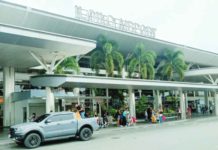
ILOILO City – Even if many are still opposed to the idea, the resumption of limited face-to-face classes is being prepped, according to the Department of Education (DepEd) in Region 6.
“The DepEd in Western Visayas is excited and ready to implement face-to-face classes,” said Regional Director Ramir Uytico.
However, he said they needed the approval of President Rodrigo Duterte.
“We are waiting for the final say of the President…his go signal,” Uytico told reporters during an online press conference yesterday.
Malacañang previously announced once the country has rolled out two million doses of coronavirus disease 2019 (COVID-19) vaccines, Duterte may authorize the pilot run of face-to-face classes.
Earlier, DepEd clarified that students would only be allowed to stay in school for a maximum of half a day should the proposed face-to-face classes push through.
The pilot run in areas with “low risk” of coronavirus disease 2019 (COVID-19) infection was supposed to be implemented in January but this was called off due to the emergence of a more infectious variant of the virus.
PILOT SCHOOLS IN WV
Meanwhile, DepEd-6 Policy Planning and Research Division chief Leo Dedoroy said 26 schools in the region have been identified as pilot areas for face-to-face classes.
These schools are in Aklan (one); Antique (two); Bacolod City (one); Bago City in Negros Occidental (one); Iloilo (five); Guimaras (two); Kabankalan City in Negros Occidental ( one); Passi City (two); Roxas City in Capiz ( one); Sagay City in Negros Occidental (six); San Carlos City in Negros Occidental (t wo); and Sipalay City in Negros Occidental (two).
These schools have secured concurrences from their respective local government units (LGUs) to pilot face-to-face classes, “which is very important because they will be helping DepEd relative to the implementation,” Dedoroy stresed.
Stringent conditions were previously laid out by the DepEd to its field offices, which included the following:
* Pilot implementation of face-to-face classes will take place only in areas categorized as low-risk (at least under modified general community quarantine.)
* There must be a commitment for shared responsibility of DepEd, the LGUs, the parents or guardians and the providers of transportation.
* Stringent health and safety standards shall be followed at home, during travel to and from the schools, and within school premises.
PARENTS NOT READY
DepEd-6 conducted consultations among parents, students and other stakeholders over the proposed face-to-face classes’ resumption.
“May mga waiver naman ito, requirements. Maybe ang mga parents sa Region 6 majority parang ayaw pa sa limited face-to face,” Uytico said.
In separate interviews by Panay News, several parents said they were against the idea.
Other children may not be able to observe minimum health protocols, especially social distancing, in school, they cited.
However, they are seeing vaccination against COVID-19 as a silver lining.
The school year 2020-2021 will end on July 10, 2021 based on DepEd Order No. 12-2021.
EARLY REGISTRATION
In another development, DepEd will conduct an early registration for school year 2021-2022 from March 26 to April 30, 2021.
“The month-long activity is initiated to ensure that incoming learners are registered for the school year and help the department better prepare for possible issues and concerns that may arise,” the DepEd penned in press release.
All incoming Kindergarten, Grades 1, 7 and 11 in public elementary and secondary schools shall pre-register to allow the Department to make necessary preparations and incoming plans for the coming school year, Secretary Leonor Briones said.
The Education chief also noted that Grades 2-6, 8-10, and 12 are considered pre-registered thus they do not need to participate in the early registration.
Early registration is mandatory for public schools while optional for private schools.
The early registration was introduced to help the department anticipate the number of enrollees for the coming school year and instituted in DepEd Order No. 3, s. 2018, or the Basic Education Policy.
Aside from incoming Kinder and Grades 1, 7 and 11 students, it also seeks to “locate, identify and register” out of school youth and children who may be identified as living with disabilities; living in an off-grid community; living in a barangay without a school; living in a geographically isolated area, among others.
“The early registration campaign ensures the right of all school-aged learners to enroll and be equally provided with quality, accessible, relevant, and liberating basic education,” the DepEd said./PN



